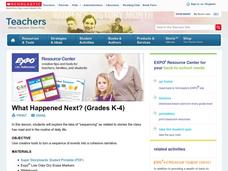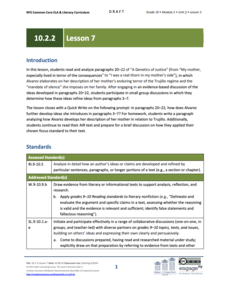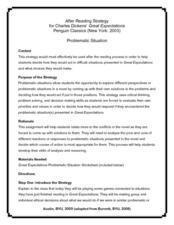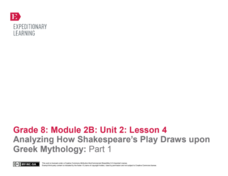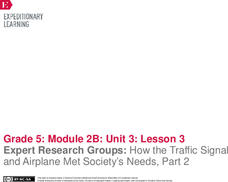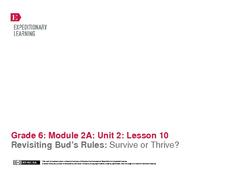Curated OER
Growing Independence and Fluency Lesson: Ready, Set, Read Expressively!
Students practice becoming more fluent readers with fluency by assessing one minute reads and repeated readings. They also practice reading silently and then read the book, "Alexander and the Terrible, Horrible, No Good, Very Bad Day,"...
Curated OER
Dandelion Wine: Anticipation Guide
What brings happiness? An anticipation guide for Dandelion Wine asks readers to ponder the concepts in Ray Bradbury’s novel about the joys of summer. The scripted plan includes the guide, additional activities, and assessment options. Do...
Curated OER
Cry, The Beloved Country: Anticipation Guide
“Poor people are poor because they are lazy and don’t work enough.” “If you are desperate, the means justify the ends.” Prior to reading Cry, The Beloved Country, class members complete an anticipation guide that focuses on issues raised...
Curated OER
Freak the MIghty: Anticipation Guide
Friendship, family, and violence are the subjects of an anticipation guide designed to accompany Rodman Philbrick's young adult novel, Freak the Mighty. Individuals complete the included guide, discuss their responses in groups, and then...
Curated OER
Reading Strategies: Main Idea
Identify the main idea and the supporting details of a story in a literacy resource from Discovery Education. Complete with procedures, vocabulary, and assessment activities, this is a great way for pupils to practice their outlining...
Curated OER
Anticipation Guide: Life of Pi
Create an anticipation guide with your class for Life of Pi. They will have likely heard of the novel and maybe even seen the movie, but provide them with this guide to get them thinking. Eight statements are given, and your class...
Curated OER
Mississippi Trial, 1955: Anticipation Guide
As an introductory activity to Mississippi Trial, 1955, class members use color-coded dots to respond anonymously to a series of statements about prejudice and responsibility to their fellow-man that are posted about the room. The...
Novelinks
The Devil’s Arithmetic: Anticipation Guide
Do you need to learn about someone's past before you can understand that person's behavior? Use an anticipation guide to think about the literary themes of Jane Yolen's The Devil's Arithmetic before you begin the novel.
Curated OER
St. Patrick’s Day
Combine math, creative writing, and leprechauns in a fun St. Patrick's Day activity! Using a bag of gold coins and marshmallows, kids write a math story about a leprechaun that includes a multi-step equation to solve.
Curated OER
Exploring the Sky: Reading Maria's Comet
Discover the science behind astronomy. After reading the book Maria's Comet, which is about a young woman who breaks new ground by becoming a female astronomer, young learners practice reading comprehension with worksheet questions about...
Scholastic
What Happened Next? (Grades K-4)
Explore the structure of narrative writing with this fun, collaborative lesson. Start by reading aloud a short story, asking small groups of learners to fill in key events on a large story board prepared on the class whiteboard....
Curated OER
Pictures in Words: Poems of Tennyson and Noyes
Learners examine how Tennyson and Noyes use words to paint vivid pictures. They read and analyze two poems, complete an online scavenger hunt, complete a worksheet, and write examples of alliteration, personification, metaphor, simile,...
Curated OER
Speak Write! Understanding the Hidden Meaning of Words
"Can the connotation of a word or phrase create bias or prejudice?" The activities in this SMART Board lesson are directed toward this question, which will be sure to incite lots of opinions and ideas. The SMART Board file guides them...
EngageNY
Grade 10 ELA Module 2: Unit 2, Lesson 7
"No flies fly into a closed mouth." Pupils consider the proverb's meaning as they read paragraphs 20–22 from the essay "A Genetics of Justice" by Julia Alvarez. They also engage in small-group discussions about how the author refines her...
EngageNY
Grade 10 ELA Module 2: Unit 2, Lesson 8
How do people's relationships with their parents impact their lives? Scholars read paragraphs 23–26 from "A Genetics of Justice" by Julia Alvarez, in which the author details her relationship with her mother. Pupils discuss how the...
Curated OER
Visual and Meaning Cues
Learn how to apply visual and meaning cues to reading unknown words. Readers will explore what to do when they come to a word they do not know as they watch the teacher model the use of these cues and then participate in guided and...
EngageNY
Grade 10 ELA Module 2: Unit 2, Lesson 4
What does it mean to come undone? Scholars consider the author's use of the phrase as they read paragraphs 12–15 from Julia Alvarez's autobiographical essay "A Genetics of Justice." They complete a quick write to analyze how Alvarez...
Curated OER
Using Graphical Displays to Depict Health Trends in America's Youth
Identify the different types of graphs and when they are used. Learners will research a specific health issue facing teens today. They then develop a survey, collect and analyze data and present their findings in class. This is a lesson...
Curated OER
Great Expectations: After Reading Strategy
Class members are asked to consider how they would respond to situations faced by characters in Great Expectations. After completing one exercise as guided practice, individuals are presented with a second problematic situation and...
Curated OER
How Do Authors Use Imagery to Shape Their Writing?
Esther Forbes' award-winning Revolutionary War novel, Johnny Tremain and excerpts from Julie Otsuka's When the Emperor Was Divine are used to model how imagery brings alive the setting of a story. The young writers then craft their own...
EngageNY
Analyzing How Shakespeare’s Play Draws upon Greek Mythology: Part 1
Scholars read the story "Pyramus and Thisbe," analyzing word choice, tone, and meaning. They then try to find the gist of the story and discuss how Shakespeare used the myth in his play A Midsummer Night's Dream.
EngageNY
Expert Research Groups: How the Traffic Signal and Airplane Met Society’s Needs, Part 2
Ready, set, act! Using the fun resource, pupils patriciate in a vocabulary charades activity to practice key terms from the unit. Next, scholars work in expert research groups to read an article about the invention of the traffic signal...
EngageNY
Looking Closely at Stanza 3—Identifying Rules to Live By Communicated in “If”
Just as Bud, from the novel Bud, Not Buddy by Christopher Paul Curtis, had rules to live by, so does the poem, If by Rudyard Kipling, but how do the two relate? Pupils delve deep into the poem's third stanza, participate in a grand...
EngageNY
Revisiting Bud’s Rules: Survive or Thrive?
Bud followed a series of rules from Bud, Not Buddy by Christopher Paul Curtis. The question is, how did he use those rules to thrive or survive? After a grand discussion, class members explore the novel to locate and cite textual...












